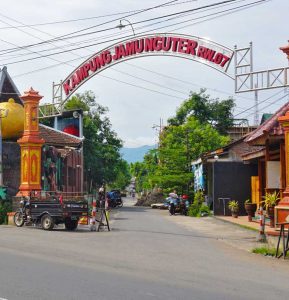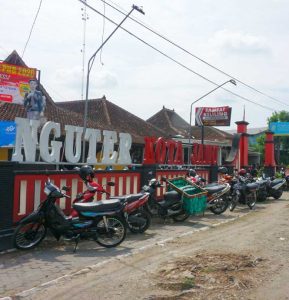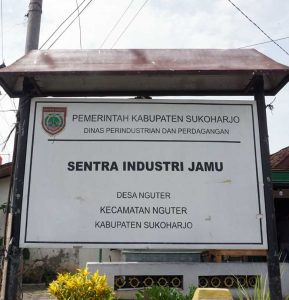A Short History & the Development of Kampung Jamu Nguter Sukoharjo
"As the center of the jamu industry recognized by the government, Kampung Jamu Nguter in Sukoharjo is able to preserve the utilization of medicinal plants in different interesting types and variants."Published by : administrator - 07/01/2025 14:10 WIB
0 Minutes read.

Kampung Jamu Nguter, Sukoharjo is a kecamatan (sub-district) whose majority of the population works as herbalists, whether cultivating raw materials, processing raw materials, distributing, or selling jamu traditionally as a jamu gendong. It is not known exactly who pioneering the jamu business in Nguter, but, even so, the efficacy of Nguter jamu is well-known by the national market.

Nguter is a subdistrict in Sukoharjo Regency, Central Java. Consisting of 16 villages, Nguter is the outermost subdistrict in Sukoharjo, because most of its outer borders have overlapped with the administrative area of Wonogiri Regency. However, there is no need to worry, this kampung jamu (herbal medicine village) can be reached approximately one hour from the center of Surakarta City, or only 30 minutes from the shopping center in Solo Baru, Sukoharjo.
In general, the use of plants as herbs or medicine in the archipelago has existed since the time of Ancient Mataram. This is evidenced by artifacts and ancient manuscripts. For Kampung Jamu Nguter, it is not known exactly who started the habit of concocting jamu. But it is believed that it has been done by the community in the Nguter area since time immemorial.
Quoted from a journal’s article titled ‘Persepsi Pelaku Industri terhadap Program Pengembangan Sentra Industri jamu di Desa Nguter Kabupaten Sukoharjo (Perception of Industry Players towards the Development Program of the Jamu Industry Center in Nguter Village of Sukoharjo Regency)’, the work of Bagus Adhi Wicaksono et al (2018), it is known that Nguter Village has been considered as a quite legendary producer of traditional Javanese jamu. The skill of concocting herbal medicine is known to have been transmitted for generations. The village became a jamu village around 1965 when jamu products began to be mass-produced and traded in general.

In 1965 only a handful of people dared to become jamu entrepreneurs. They include Sabdo Palon, Wisnu, Kresna, and others. But because the opportunity is great, over time other residents also pioneered the jamu business. The uniqueness of Kampung Jamu Nguter is that the jamu industry in this village is really from upstream to downstream. The village has areas that are considered suitable for the growth of medicinal plants and make many residents decide to cultivate medicinal plant gardens. From there the harvest is processed into jamu which are then sold in markets, stalls, jamu gendong, and kafé.

Still according to the journal by Bagus Adhi Wicaksono, formerly many jamu entrepreneurs came from RW 6 and RW 7(RW= Rukun Warga, a sub-village), then expanded widely to other regions. In 2012 the Indonesian Ministry of Health designated RW 6 and RW 7 as Kampung Jamu.
Until 2018, there are two groups of jamu industry in Kampung Jamu Nguter. The two groups consist of 60 units of business people. Twenty-two units are in RW6 and RW7. Twenty-eight units in RW5, and the remaining 10 units are spread across other RW. The RW5 location is considered the most strategic because it is the closest to Pasar Jamu Nguter.
KAMPUNG JAMU NGUTER PRODUCTS
Along with the times, Kampung Jamu Nguter produces various processed jamu. Starting from the conventional model of jamu, ready-to-brew powdered jamu, to processed jamu combined with other ingredients so that it is not only sour and bitter in their taste.
In Kampung Jamu Nguter there is a Jamu Cafe which is located close to Pasar Jamu Nguter. Quoted from Solopos.com, Kafe Jamu Nguter was established with the concept of lifting jamu products in order to compete in local and international markets. The café sells a variety of traditional jamu drinks that are expected to preserve the culture of jamu drinking and become a supporter of Sukoharjo as Jamu Tourism Destination.








